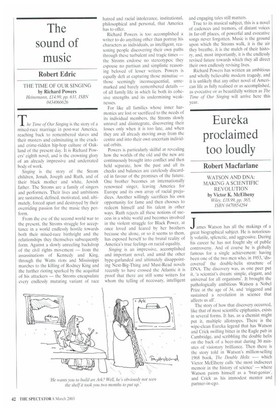The sound of music
Robert Edric
THE TIME OF OUR SINGING by Richard Powers Heinemann, £14.99, pp. 631, ISBN 0434060626 The Time of Our Singing is the story of a mixed-race marriage in post-war America, reaching back to remembered slaves and their masters and culminating in the crackand crime-ridden hip-hop culture of Oakland of the present day. It is Richard Powers' eighth novel, and is the crowning glory of an already impressive and underrated body of work.
Singing is the story of the Strom children, Jonah, Joseph and Ruth, and of their black mother and white, Jewish father. The Stroms are a family of singers and performers. Their lives and ambitions are sustained, defined, motivated, and, ultimately, forced apart and destroyed by their overriding passion for the music they perform.
From the eve of the second world war to the present, the Stroms struggle for acceptance in a world endlessly hostile towards both their mixed-race birthright and the relationships they themselves subsequently form. Against a slowly unreeling backdrop of the civil rights movement — from the assassinations of Kennedy and King, through the Watts riots and Mississippi marches to the killing of Rodney King and the further rioting sparked by the acquittal of his attackers — the Stroms encapsulate every endlessly mutating variant of race hatred and racial intolerance, institutional, philosophical and personal, that America has to offer.
Richard Powers is too accomplished a writer to do anything other than portray his characters as individuals, as intelligent, reasoning people discovering their own paths through these turbulent and tragic times — the Stroms endorse no stereotypes; they espouse no partisan and simplistic reasoning beloved of lesser writers. Powers is equally deft at capturing those minutiae — those seemingly inconsequential, unremarked and barely remembered details — of all family life in which lie both its cohesive strengths and its undermining weaknesses.
For like all families whose inner harmonies are lost or sacrificed to the needs of its individual members, the Stroms slowly unravel and disintegrate, discovering their losses only when it is too late, and when they are all already moving away from the centre and into their own uncertain individual orbits.
Powers is particularly skilful at revealing how the worlds of the old and the new are continuously brought into conflict and then held separate, how the past and all its checks and balances are carelessly discarded in favour of the promises of the future. One brother becomes an internationally renowned singer, leaving America for Europe and its own array of racial prejudices. Another willingly sacrifices his own opportunity for fame and then chooses to redeem himself and his talent in other ways. Ruth rejects all these notions of success in a white world and becomes involved in the violent struggle for Black Power, at once loved and feared by her brothers because she alone, or so it seems to them, has exposed herself to the brutal reality of America's true feelings on racial equality.
Singing is an impressive, accomplished and important novel, and amid the other hype-garlanded and ultimately disappointing Next-Big-Thing and Must-Read novels recently to have crossed the Atlantic it is proof that there are still some writers for whom the telling of necessary, intelligent
and engaging tales still matters.
True to its musical subject, this is a novel of cadences and tremors, of distant voices in far-off places, of powerful and evocative songs never forgotten. Music is the ground upon which the Stroms walk, it is the air they breathe, it is the mulch of their history, and, most importantly, it is the endlessly revised future towards which they all direct their own endlessly revising lives.
Richard Powers has written an ambitious and wholly believable modern tragedy, and it is unlikely that any other novel of American life as fully realised or as accomplished, as evocative or as beautifully written as The Time of Our Singing will arrive here this year.


































































 Previous page
Previous page